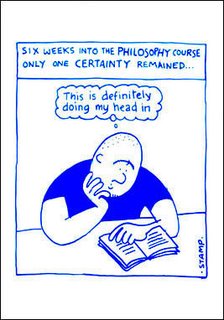
I have been doing some work around the amount of structure someone needs. A case came up recently where a manager who had a very high tolerance for ambiguity was head of a team that had a low tolerance for ambiguity.
The situation was that the manager needed no structure, to him everything was an exploration; he followed ideas, went with some very odd ideas and came up with quite brilliant products. He also had a lot of failure which he was quite happy with he as would just move on if an idea didn't work. He hated having structure placed on him from above, consequently he placed no structure on his team, which they reported as being stressful. They wanted direction, guidance and targets, such things made them feel comfortable and 'loved'. These were the last thing he wanted, he saw being given such things as 'failure'. Why else would someone try to impose direction, guidance and targets unless they were unhappy with what he was doing? Giving such structure was in his eyes was only done in failure conditions.
His team on the other hand felt that he didn't care about them because he didn't provide this for them.
It would appear that an individuals ambiguity tolerance and the need for structure are highly inversely correlated - the higher the level of tolerance for ambiguity the less structure an individual needs. However this can cause problems with individuals for which structure helps them function efficiently. Looking at the work of Michael Kirton there are a number of other significant correlations:
People with low tolerance to ambiguity (Adaptors) tend to be:
- Characterised by precision, reliability, efficiency; seen as methodical, prudent, disciplined
- Concerned with resolving problems rather than finding them
- Seeks solutions to problems in tried and understood ways
- Reduces problems by improvement and greater efficiency, with maximum of continuity and stability
- Seen as sound, conforming, safe, dependable
- Does things better
- Liable to make goals of means
- Seems impervious to boredom, seems able to maintain high accuracy in long spells of detailed work
- Is an authority within given structure
- Challenges rules rarely, cautiously, when assured of strong support and problem solving within consensus
- Tends to high self-doubt when system is challenged, reacts to criticism by closer outward conformity; Vulnerable to social pressure and authority; compliant
- Is essential to the functioning of the institution all the time, but occasionally needs to be ‘dug out’ of the current systems
- When collaborating with innovators: supplies stability, order and continuity to the partnership
- Sensitive to people, maintains group cohesion and cooperation; can be slow to overhaul a rule
- Provides a safe base for the innovatorÂ’s riskier operations
People with a hitolerancence to ambiguity on the otherhand tend to be:
- Innovators:Seen as thinking tangentially, approaching tasks from unsuspected angles; undisciplined, unpredictable
- Could be said to discover problems and discover less consensually expected avenues of solution
- Tends to query a problemÂ’s concomitant assumptions; manipulates problems
- Is catalyst to settled groups, irreverent of their consensual views; seen as abrasive, creating dissonance
- Seen as ingenious; unsound, impractical
- Does things differently
- In pursuit of goals liable to challenge accepted means
- Capable of detailed routine (system maintenance) work for usually only short bursts. Quick to delegate routine tasks
- Tends to take control in unstructured situations
- Often challenges rules. May have little respect for past custom
- Appears to have low self-doubt when generating ideas, not needing consensus to maintain certitude in face of opposition; less certain when placed in core of system
- In the institution is ideal in unscheduled crises; better still to help to avoid them, if can be trusted by adaptors
- When collaborating with adaptors: supplies the task orientations, the break with the past and accepted theory
- Appears insensitive to people when in pursuit of solutions, so often threatens group cohesion and cooperation
- Provides the dynamics to bring about periodic radical change, without which institutions tend to ossify
From Adaptors & Innovators - Why New Initiatives Get Blocked by Dr M J Kirton
An interesting paradox when mixed in the workplace.

